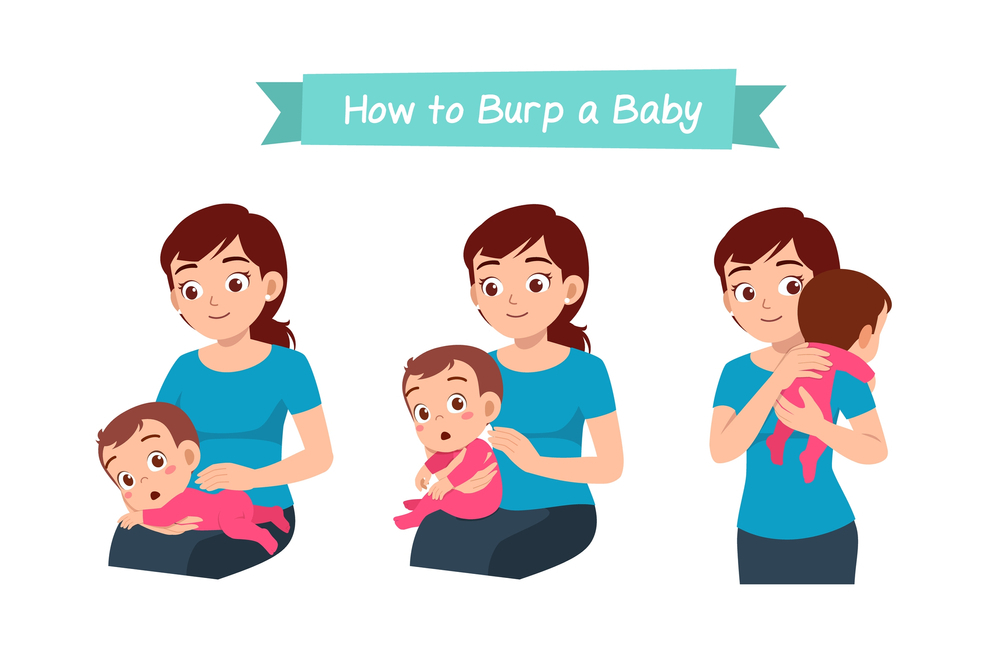Once the feeding is done, the patting begins. People have been burping babies for hundreds, maybe thousands of years. Here’s why!
Your baby tends to swallow a lot of air during feeding. It’s likely to make them feel uncomfortably full. They drink all of their calories, which means they can gulp a lot of air. So the next time your baby is fussy post feeding, you know he’s gassy. Burping can make them feel better!
When to burp your baby?
The American Academy of Pediatrics (AAP) recommends to burp your baby regularly, even if they don’t show discomfort or release any gas when you burp them.
Make it fit naturally and not tasking! For example, burp before switching breasts and when you are done feeding. Bottle-feeding parents can burp between every 2 to 3 ounces for newborns. We don’t know how much air the baby swallows while feeding. So follow the routine, even when your baby is not fussy. Even if your baby is asleep, burping may be helpful to allow them to relieve gas so they don’t get uncomfortable or wake up too soon.
There’s no defined limit to stop burping your baby, but as your little one gets older and their digestive system becomes more mature, burping will not be necessary – usually it’s around 4 to 6 months.
How to burp your baby?
There is no hard and fast rule that you have to follow one position. Learn the signs of trapped gas and different techniques to burp your baby. Try these positions while making your baby burp and feel free to freeze what works for you and your baby.
Over your shoulder: Hold your baby on one shoulder and pat or rub their back with one hand while holding the baby with the other.
Over the chest: Hold the baby lower, close to your chest and pat.
Sitting on your lap: Hold your baby in a seated position on your lap, leaning slightly forward. Support baby’s head and chest with one arm while you pat or rub with the other.
Lying across your lap: Simply move your baby to a laying position on their tummy on your lap while you are seated. This position puts pressure on their belly and you can gently pat their back until they burp. You can even try this position while standing.
Still showing signs of trapped gas?
Try lying your baby on the back and gently massage the tummy. Try moving your baby’s legs back and forth, like riding a bike. If nothing seems to bring gas relief and you have an uncontrollably fussy baby at home, approach your pediatrician for help.

Burping your baby - Top tips
- Make sure you cup your hands while patting your baby and be gentle. You don’t want to hit hard and make your baby vomit.
Use a burp cloth over your clothes. The next thing you don’t want is to clean up the mess.
Let the bottle settle a bit before feeding your baby (shaking adds lots of air to the formula) and choosing an age-appropriate nipple.
Gas drops and gripe water are readily available at pharmacies but ask your doctor first before using any of them.
Burp frequently while feeding a baby with reflux.
Tips and tricks to prevent excess gas in the baby
The tips below will help you prevent turning your baby into a gas machine.
Watch for signs of a fast letdown of milk from the breast. If the milk comes out too quickly at the beginning, and the baby is gulping or gasping, take the baby off the breast for a few seconds. Catch the excess milk in a towel or cloth if necessary. Once the milk flow has slowed down, put the baby back on the breast.
While bottle feeding, test the flow of a bottle’s nipple before giving it to the baby. Try paced bottle feeding. Use a slow flow nipple on bottles, especially for newborns. Fast flow nipples may cause the baby to swallow more air. Remember to replace bottle nipples if the hole gets bigger, or the nipple shows signs of wear.
What happens if you don't burp your baby?
Maybe you’re worried that not burping babies will cause them to spit up more. That’s actually been studied! Although burping is a rite of passage, the study showed that burping did not lower colic events and in fact, there was significant increase in regurgitation episodes in healthy term infants up to 3 months of follow-up. So next time you are worried your baby won’t burp, relax!
Remember that burps and spit-up are completely normal, but projectile vomiting is not. In that case, if you have any concerns regarding your baby’s digestion, approaching the pediatrician is the best bet.


Super helpful write up, thank you for this..
Can you also help with solids for babies and when to start?
I’m a first time mom…need some help
Sure. Coming soon!